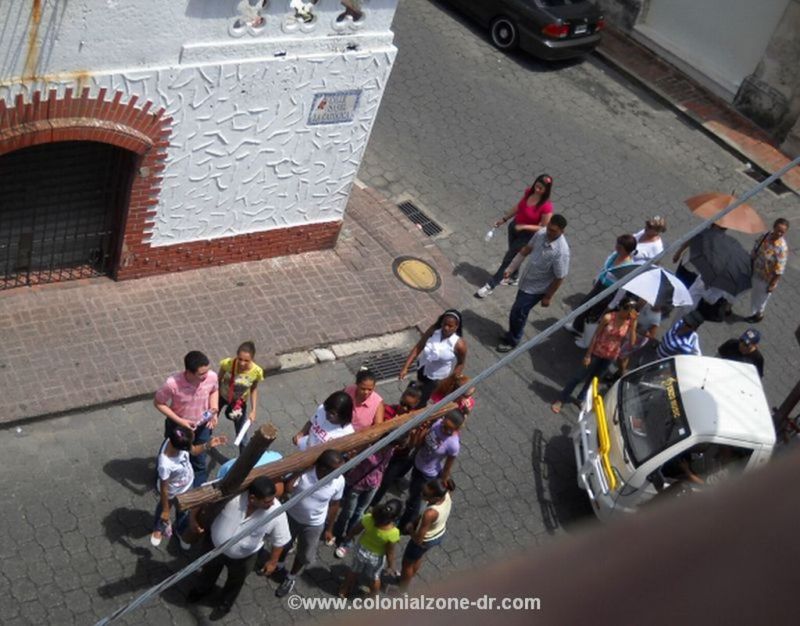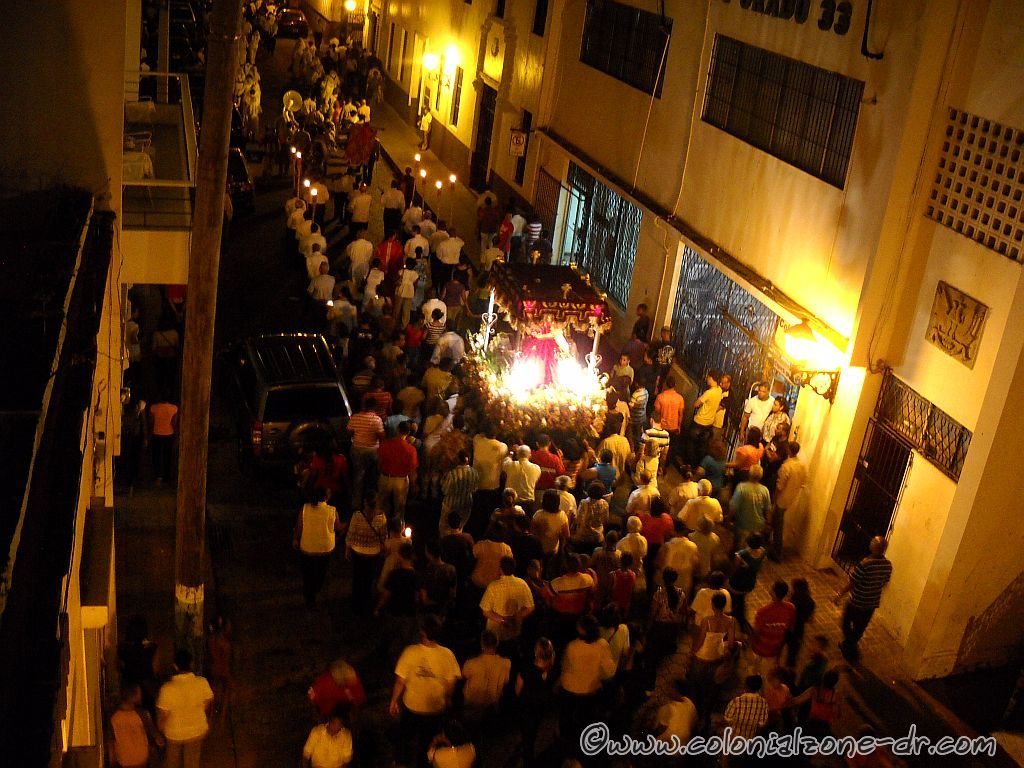Semana Santa, República Dominicana / Holy Week, Dominican Republic
1.Semana Santa Description 2.Traditional Foods 3.Operation Semana Santa Safety Restrictions
Semana Santa / Holy Week/ Easter
is a very important time here in Dominican Republic. Religious Holidays are recognized countrywide since the countries main population is Catholic. Christmas, Epiphany and other religious holidays are very important but Semana Santa is the most important of all these religious holidays.

The long weekend for the Easter holiday is usually used to go away, usually with family. The churches are full as people respect the celebration of the death and resurrection of Jesus or El Senor. Most people go home, wherever this may be, just to hang with family and friends or just to visit the old hometown. Others flock to the beaches, rivers and other tourist areas to take advantage of the 3 days free from working. The city of Santo Domingo turns into a ghost town. Most businesses and stores are closed. Highways and streets are almost empty except for the main roads leading out of the cities. Sunday evening the roads fill. There are traffic jams galore. All is congested once again with all the people returning to their homes and get back to real life once again.

Be aware! If you plan on visiting Dominican Republic during this time, especially heading to beach and recreation areas I highly suggest that you make your reservations in hotels far in advance. Most hotels are full and it will be very difficult to find a bed to lay your weary head if you procrastinate.

There are Police, Military, Red Cross and many volunteers along the roads and at all the main intersections making sure people are obeying the traffic laws. They are also stationed on the beaches and at the popular rivers to ensure that people have fun and are safe.
The Dominican Civil Defense will be stationed throughout the country with the participation of around six thousand workers and more than eight thousand volunteers in over 1400 strategic locations. They will be watching beaches, rivers and highways to make sure the big weekend runs smoothly.
As per the Catholic tradition first comes Ash Wednesday / Miércoles de Ceniza. Holy Week starts on Palm Sunday / Domingo de Ramos. On Holy Thursday / Jueves Santo morning is the Chrism Mass / Misa Crismal and in the evening is the Mass of the Lord’s Supper, accompanied by the washing of feet and a procession. At noon on Good Friday / Viernes Santo is the Sermon on the Seven Words. Holy Saturday/ Sabado Santo an Easter Vigil is held from around 11pm until dawn. Then on Easter Sunday / Domingo de Resurrección or Domingo de Pascua there is an Easter Mass at noon.
A beautiful tradition on Saturday is kite flying. From the ground or from the rooftops you will see the skies full of all types of kites, known in Dominican Republic as chichiguas. Kites made of paper and plastic bags. It does not matter. They are flown as a sign of hope for all.

Nuestra Señora de las Mercedes
The church of Las Mercedes (on Calle Mercedes and Jose Reyes in Zona Colonial) is the place to be in Santo Domingo for the religious ceremony. After the service, around 5PM, there is a procession to the first cathedral in the Americas, Cathedral Santa Maria. Here is held a special Mass called Eucharist.

Gaga celebrations
are held in many areas of the country, especially areas with large Haitian settlements and communities with strong African roots. Here in Santo Domingo in the city of Villa Mella one can see and hear these gaga drum celebrations with music and dancing. Gaga ceremonies have both magical and religious parts. The spirits are invoked including Luaces (lights in Creole) along with other mysterious, holy and powerful beings. There is usually lots of music, dancing and drinking. (A little information about GaGa)
Other celebrations include the Guloyas in San Pedro de Macoris. They are known for their colorful outfits and lively dances and characters that walk the streets.

The last Cardinal of Dominican Republic, Nicolas de Jesús López Rodriguez, and the Bishops walking across Calle Isabel la Catolica to the Sunday Easter Mass at the Cathedral Santa Maria, the first Cathedral in the Americas, in Ciudad Colonial.
See the picture collection of the 2014 Good Friday Procession in Ciudad Colonial.

Dominicans have their traditional food dishes
they prepare for Holy Week. Since many people do not eat meat during this time fish and seafood are very popular. Potato Salad Dominican style is a favorite. The most popular dish is called habichuelas con dulce / Sweet Beans and usually can be found in every home throughout the country. It is a mix of red beans, condensed milk, spices and other ingredients served cold pudding style. Usually, these dishes are made in large quantities to serve all who might visit and to share with the neighbors. Here is the recipe for habichuelas con dulce in case you want to give this traditional dessert a try.
The Semana Santa Procession
on the corners of Calle Padre Billini and Isabel la Catolica in Ciudad Colonial 2012. It is not very clear. I am sorry. It was getting dark. I tried to lighten it some.
Operation Holy Week/ Operativo Semana Santa
During the holiday weekend there are many restrictions according to Resolution No. 96/2012.
*Jet Skis and Wave Runners, Motorized Boats, Horses, Motorbikes, and Motorized Vehicles are NOT permitted on the beaches in the entire country from Thursday to Sunday.
*There will be NO boats used in
-Laguna Gri Gri in Rio San Juan
-The Sanoa Island
-Catalina Island
-Cayo Levantado Island
*Heavy equipment vehicles are prohibited to be on highways from 6AM Thursday until 6AM Monday.
*There is usually a curfew of 5:45PM for swimmers to get out of the water daily on busy public beaches.
*Many places have a ban on loud music for the weekend. Inside businesses it is OK but the noise is not permitted to weft outside. This is not enforced like it used to be but it still happens in many locations. It is especially quiet on Good Friday around noon until midnight.
*Many beach areas have a “No Glass” rule in force. You cannot enter the beach area with any alcoholic beverage in glass bottles.
*Many of the more dangerous beaches and rivers are closed (some closed beaches include San Soucí, Manresa, Güibia, the coastline of Avenidas España and Las Américas, the beach of San Andrés, banks of the Ozama River, Río Isabela Norte, la Poza in Hato Nuevo, San Rafael, Los Patos, River Yaque del Norte. Also the Damns of Bao, Taveras, El Pinalito, López Angostura, El Papayo, Sabana Yegua, de Yuboa and de Chacuey) at this time to ensure public safety. Also, water motor sports are prohibited close to beach areas during the holiday. There is usually a complete listing of the closed areas on the Civil Defense web site http://www.defensacivil.gov.do. I will also post any special events and happenings in the area on the Colonial Zone News Blog.


